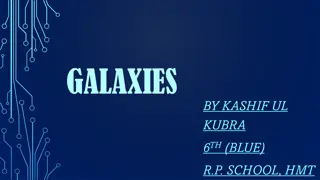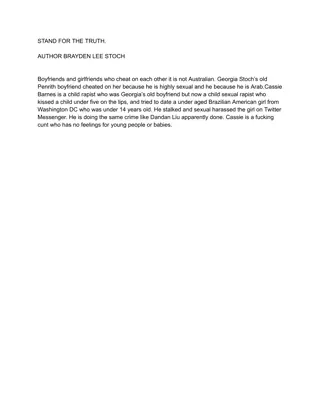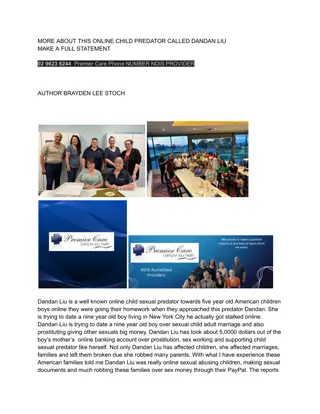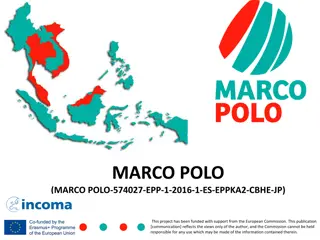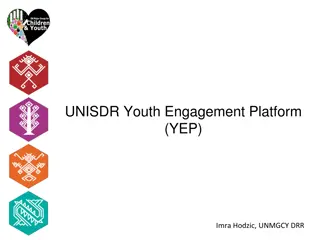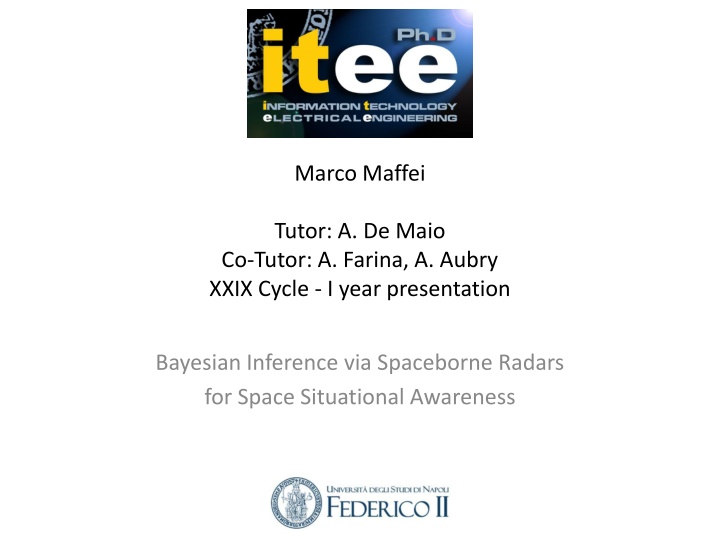
Bayesian Inference via Spaceborne Radars for Space Situational Awareness
Explore the groundbreaking research on Bayesian Inference using Spaceborne Radars for enhancing Space Situational Awareness. The study delves into strategies supporting governmental missions to safeguard satellites in orbit. With a focus on cognitive-based payload transceivers, this work aims to revolutionize debris detection and tracking capabilities in space.
Download Presentation

Please find below an Image/Link to download the presentation.
The content on the website is provided AS IS for your information and personal use only. It may not be sold, licensed, or shared on other websites without obtaining consent from the author. If you encounter any issues during the download, it is possible that the publisher has removed the file from their server.
You are allowed to download the files provided on this website for personal or commercial use, subject to the condition that they are used lawfully. All files are the property of their respective owners.
The content on the website is provided AS IS for your information and personal use only. It may not be sold, licensed, or shared on other websites without obtaining consent from the author.
E N D
Presentation Transcript
Marco Maffei Tutor: A. De Maio Co-Tutor: A. Farina, A. Aubry XXIX Cycle - I year presentation Bayesian Inference via Spaceborne Radars for Space Situational Awareness
Roadmap Template CONTENT Cover Background Graduation MS, DIETI group, cooperations (mostly written) Type of fellowship Problem Specific (1 minutes) Research Activity (3 minutes) idea, methodology, developments, expected results, validation Products List and mention Next Years I year credits (table, mark in red if discrepancies occurs with PhD web site table) Specific objects(say) Table for training (expected credits) no words Marco Maffei 2
Cover & Background Background Dr. Ing. Degree in Electrical Engineering at the University of Roma TRE, Rome, Italy in 2004. IN FIERI Ph.D. Degree in Information Technology and Electrical Engineering at the University of Napoli Federico II, Naples, Italy. Department of Information Technology and Electrical Engineering. Dissertation Title: Bayesian Inference via Spaceborne Radars for Space Situational Awareness. Advisors Alfonso Farina (Selex ES retired), Antonio De Maio (University of Napoli Federico II), Augusto Aubry (University of Napoli Federico II). Dissertation expected in 2021. Affiliations IEEE Senior Member (M 08 - SM 18) Aerospace and Electronic Systems Society - Vice Chair & Treasurer AES Chapter IEEE Italy Section Signal Processing Society Marco Maffei 3
Problem How can we support governmental strategies to acquire a ..capability to watch for objects and natural phenomena that could harm satellites in orbit [1] ? [1] http://www.esa.int/ssa-sst Marco Maffei 4
Research Activity (1/3) Idea Despite increasing demands for augmenting space-based monitoring capabilities for near-Earth SSA, there is no evidence of operative Spaceborne Radars (SBR) for debris detection and tracking. In the absence of SBR experimental data, one may certainly conjecture on the design of a novel cognitive-based payload transceiver with specific benefits for SSA with respect to ground based assets inference capabilities. Spacecraft 108 109 101 102 103 104 105 110 Act Store Reset Avoidance Orbit Calculator Avoidance Commands Orbit Ephemerides Generation Collision Calculator Thrust Controller 106 SBR Determination 107 G/S Operations augmenting Autonomous S/C G/S Operations controlling Non Autonomous S/C Methodology Gedankenexperiment to nurture SSA data fusion systems with novel spaceborne signatures estimations (PhD work based on analysis and simulation i.e. no breadboarding activities). Marco Maffei 5
Research Activity (2/3) Developments, Expected Results, Validation Providing a harmonizing ontological framework for the possible environmental scenario to cope with. The objective of such an ontology is strictly related to the conceptual modeling of both channel and target phenomenology, thus paving the way for reasonable a priori formulations needed by Multi Target Tracking (MTT) Bayesian paradigms. (COMPLETE) Outlining possible SBR payloads archetypes, beyond current Synthetic Aperture Radar (SAR) imaging purposes, as tailored to the general tasks of debris detection and parameter estimation pertaining to air-to-air Real Aperture Radars (RAR) taking into account legacy pulse Doppler radar systems. (IN FIERI) Harmonizing radar frameworks for target detection and tracking in terms of both multi-target and cognitive perspectives, following the work by Dr. K. Bell (et al.), Dr. A. Farina, A. De Maio, S. Haykin. Considering the limits of Poisson Point Processes (PPP) for hyper-velocity multi-target densities tracking via iFilters, and possibly adopting techniques from stochastic geometry, following the work by Dr. R. Streit (et al.), Dr. R. Mahler (et al.), Dr. A. Farina (et al.), Dr. B.-T. Vo and Dr. B.-N. Vo et al.) and machine learning following the work by Dr. S. Haykin (et al.) (IN FIERI) Marco Maffei 6
Research Activity (3/3) High Level Block Scheme of the Spaceborne Radar Archetype SBR Space SBR Sensor SBR Processor Action SBR Servo Delay Controller Perception Classical cascade of signal processor and data processor including an additional controller, which perceives feedbacks data from the processor itself and, by virtue of a constrained optimization framework, performs in closed loop a retroaction on both the sensor and processor future behaviour relying on the so-called perception-action-cycle paradigm for target tracking. Marco Maffei 7
Research Production M. Maffei, A. Aubry, A. De Maio, A. Farina, Bayesian Inference via Spaceborne Radars for Space Situational Awareness, Dissertation Draft Chapter 1 Introduction(complete minor revisions) Chapter 2 Space SituationalAwareness via SBR (complete minor revisions) Chapter 3 Ontology for DynamicEnvironmentalScenarioscomplete minor revisions) Chapter 4 Architectural Archetypes for SBR (in fieri) Chapter 5 SBR MTT for Individual and Cloud Debris Classes (in fieri) Chapter 6 Conclusions(in fieri) M. Maffei, A. Aubry, A. De Maio, A. Farina, On the Exploitability of the Ka Band for Spaceborne Radar Debris Detection and Tracking Measurements, 2019 IEEE International Workshop on Metrology for Aerospace, Torino, Italy, June 2019. M. Maffei, A. Aubry, A. De Maio, A. Farina, On the Exploitability of the Ka Band for Spaceborne Radar Debris Detection and Tracking, Poster for Workshop on Mathematical Models for Science and Engineering, University of Napoli Federico II, September 11-13, Napoli, Italy. M. Maffei, A. Aubry, A. De Maio, A. Farina, An Ontology for Spaceborne Radar Debris Detection and Tracking, to be submitted to the IEEE AESS Magazine. Marco Maffei 8
Way Forward Continuing to focus on many books and papers as well as courses, seminars, and research activities under the guidance of the advisors. It is planned to extend the 2018/2019 activities also during 2019/2020 and 2020/2021. Additional courses, seminars, and books on Matrix Analysis (Horn), Optimization (Bertsekas), Machine Learning (Haykin), Radar Systems and Statistical Signal Processing (Farina, De Maio), Stochastic Geometry (Streit). A Course Syllabus has been prepared - Novel Spaceborne Radars Archetypes in the Space Economy - draft July 2019. Completing M. Maffei, A. Aubry, A. De Maio, A. Farina, Bayesian Inference via Spaceborne Radars for Space Situational Awareness, Dissertation Draft with Chapters 4-5-6. Dissemination within IEEE AESS, IEEE SPS, IEEE GRSS, ESA, NASA, NATO. Marco Maffei 9



